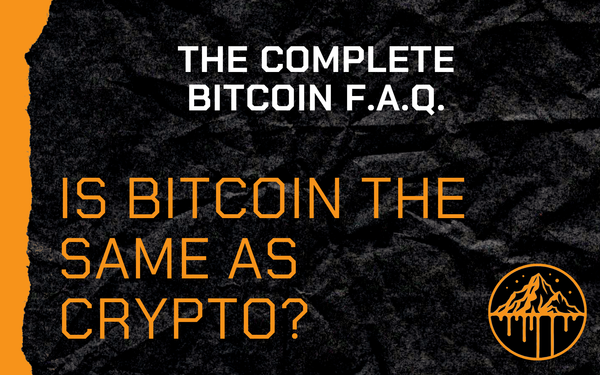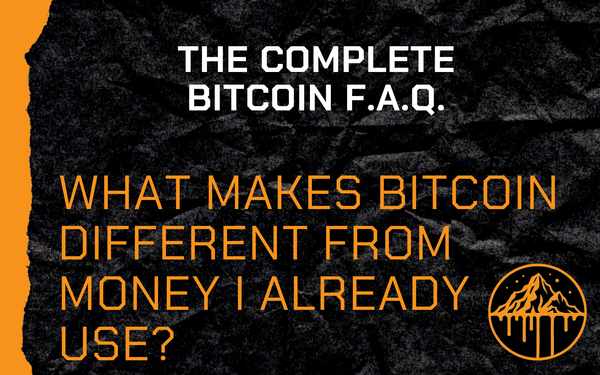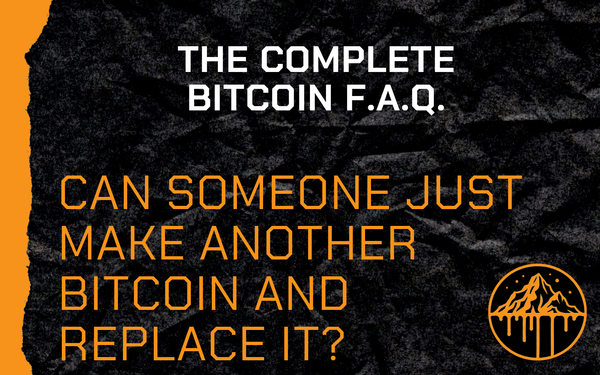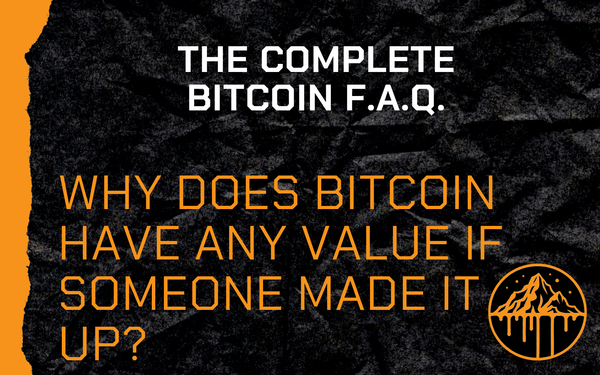Bitcoin Reads: Gresham’s Law and the Housing Crisis (Broken Money by Lyn Alden)
The media claims there’s a housing shortage. But is that really true? We don’t have too few homes—we have too much money chasing them.
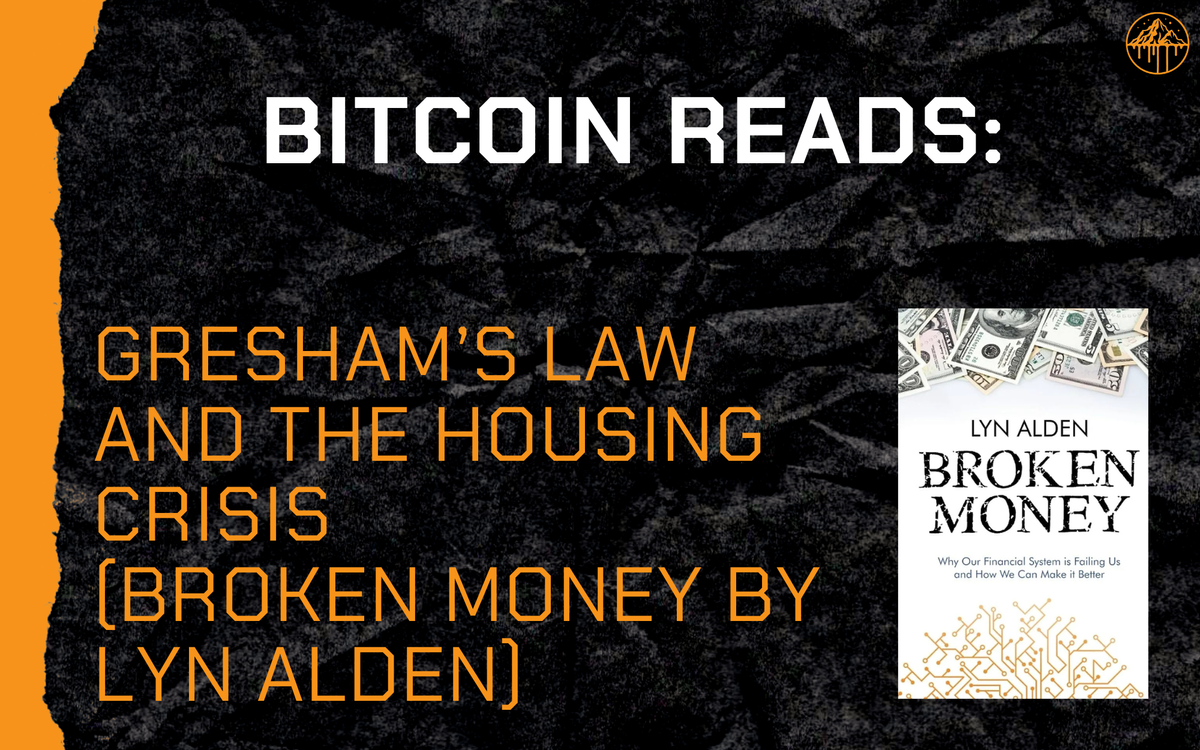
Bitcoin Reads is a deep-dive essay series that explores key financial books through the lens of Bitcoin and sound money. Each installment engages with a book’s core ideas, challenges mainstream economic narratives, and reveals hidden biases that keep people trapped in fiat thinking. By bridging these insights with Bitcoin’s principles, Bitcoin Reads helps readers see the financial system—and their own beliefs—more clearly.
Why Are Houses So Expensive? You’re Looking at It Backward.
The media claims there’s a housing shortage. But is that really true? We don’t have too few homes—we have too much money chasing them.
For decades, people have used real estate as a store of value, not because they need homes, but because fiat money is broken. This is Gresham’s Law in action: bad money (inflationary fiat) drives good money (scarce assets) out of circulation. When the currency is weak, people park wealth in something stronger.
Today, that “stronger money” isn’t just gold and fine art—it’s houses, stocks, and collectibles. The result? Artificial scarcity that locks younger generations out of homeownership. If wealth were stored in hard money like Bitcoin, housing wouldn’t need to be a savings account, and prices would drop to reflect true supply and demand.
What Is Gresham’s Law?
The 16th-century economist Thomas Gresham observed that bad money drives out good money when both circulate in the economy. If a government debased its coins by mixing in cheap metals, people hoarded the old gold and silver coins while spending the debased ones.
The same thing happens today. Except instead of hoarding gold coins, people hoard houses, equities, and scarce assets—because fiat is melting (see what I did there?).
As Lyn Alden puts it in Broken Money:
“When money in a society keeps degrading in value, there is a strong incentive to hold other things that have greater scarcity, and thus to add a monetary premium to those other things above and beyond the utility value of those things.”
This is why nobody saves in cash anymore. Instead, people are forced to put their savings into real estate, stocks, and collectibles—not because they want to speculate, but because they have no choice.
The Housing Market Is Not a Market Anymore
The root cause of unaffordable housing isn’t a shortage—it’s that housing has been turned into money. When the dollar loses purchasing power every year, real estate becomes a better savings account than a bank.
Lyn Alden explains:
“In weak money environments where supply of money keeps growing and interest rates are below the prevailing inflation rate, then there is a strong incentive to avoid cash and instead to hold second or third homes, to buy stocks, and to own a large assortment of collectibles at inflated valuations.”
This is why home prices keep rising.
- Older generations buy second, third, or fourth properties—not to live in, but to store wealth.
- Corporations and institutional investors buy entire neighborhoods, turning them into rentals because it’s a better bet than holding cash.
- Foreign investors park capital in real estate, not because they want to live there, but because it’s a better store of value than their own currency.
If housing were truly scarce, we wouldn’t see entire city blocks of empty luxury condos.
The truth is simple: houses are being used as savings accounts.
The Broken Incentives of Fiat Money
The real estate bubble is a fiat phenomenon. Money printing fuels asset bubbles, pushing prices higher and making homeownership impossible for younger generations.
Alden describes the problem:
“If houses get monetized and left empty for most of the year due to wealthy investors and upper-middle-class investors buying extra ones with cheap credit, then it can crowd out the middle class and working class from having access to affordable shelter.”
- The winners? Those who already own homes and assets.
- The losers? Young workers, renters, and first-time buyers.
This isn’t an accident. It’s the system working as designed.
How Bitcoin Fixes This
Bitcoin offers a true store of value that doesn’t require turning homes into investment vehicles. If people stored wealth in hard money instead of real estate, housing prices would reflect actual demand for shelter, not monetary debasement.
Alden lays it out:
“When money in a society maintains its value well over time, there is an incentive to hold wealth in it.”
If Bitcoin were the default store of value:
- Fewer people would buy multiple houses just to preserve capital.
- Homes would be purchased primarily to be lived in—not as speculative bets.
- Prices would stabilize, making homeownership accessible again.
Hard money leads to fair prices. Weak money distorts markets.
Final Thought: Bitcoin or Bubble?
The problem isn’t housing. The problem is monetized housing.
We don’t have a home shortage—we have a sound money shortage.
As long as fiat continues debasing, houses will be hoarded like gold bars—trapping younger generations in a cycle of inflation, rising rents, and financial insecurity.
The choice is clear: continue financializing everything, or adopt Bitcoin and return assets to their true purpose.
Which world do you want to live in?
IMPORTANT: If you enjoyed this essay, make sure you grab Lyn’s book, Broken Money: Why Our Financial System is Failing Us and How We Can Make it Better. It’s fantastic!
Wealth melts. How much you got left?
Disclaimer: Melting Wealth is not financial advice. It’s a wake-up call. Think for yourself, question the system, and take responsibility for your decisions. Your money, your risk, your move.


